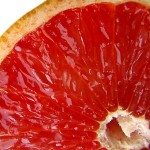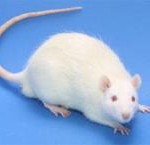 There’s no question that artificial sweeteners have fewer calories than sugar, but does using a sugar substitute lower the total number of calories we consume? Research indicates we might actually eat more. “If you eat a pound of chocolate, you’re done with it. At least for most people, your brain says, ‘That’s enough.’ This is hypothetical and needs to be tested, but maybe the sucralose sets the sweet taste response in motion but it might not turn the brain response off.” Read more
There’s no question that artificial sweeteners have fewer calories than sugar, but does using a sugar substitute lower the total number of calories we consume? Research indicates we might actually eat more. “If you eat a pound of chocolate, you’re done with it. At least for most people, your brain says, ‘That’s enough.’ This is hypothetical and needs to be tested, but maybe the sucralose sets the sweet taste response in motion but it might not turn the brain response off.” Read more
Tag Archives: food
Grapefruit and the Pill
 How the press scared readers with headlines like “Hunt for DVT Cause Reveals Link to Grapefruit.” Wouldn’t you read a story that claims grapefruit causes deadly blood clots? The case was much more complicated than the grapefruit diet. It included birth control pills, a long car trip, and a pre-existing condition. “As several of the better stories pointed out, it’s unwise to do anything in extreme. When part of a balanced diet, grapefruit should not be dangerous. Given increasing evidence of the potency of the grapefruit flavonoid naringin, medical science may want to consider whether women on birth control pills should avoid eating grapefruit every day.” Read more
How the press scared readers with headlines like “Hunt for DVT Cause Reveals Link to Grapefruit.” Wouldn’t you read a story that claims grapefruit causes deadly blood clots? The case was much more complicated than the grapefruit diet. It included birth control pills, a long car trip, and a pre-existing condition. “As several of the better stories pointed out, it’s unwise to do anything in extreme. When part of a balanced diet, grapefruit should not be dangerous. Given increasing evidence of the potency of the grapefruit flavonoid naringin, medical science may want to consider whether women on birth control pills should avoid eating grapefruit every day.” Read more
"Killer" grapefruit?
 Grapefruit is a particularly bitter taste – something supertasters are unlikely to indulge in. This post and the next concern the story of a woman who had been on a grapefruit diet – and taken a long car ride – just before experiencing deep vein thrombosis (DVT). … “How did the media handle this story? It was all about the grapefruit, something anyone might innocently eat — and then promptly die. Or at least lose a leg to gangrene. I suppose, to give the media the benefit of the doubt, they probably saw this as a ‘teachable moment.’ Unfortunately, outright fear of ‘killer grapefruit’ was the wrong lesson.” Read more
Grapefruit is a particularly bitter taste – something supertasters are unlikely to indulge in. This post and the next concern the story of a woman who had been on a grapefruit diet – and taken a long car ride – just before experiencing deep vein thrombosis (DVT). … “How did the media handle this story? It was all about the grapefruit, something anyone might innocently eat — and then promptly die. Or at least lose a leg to gangrene. I suppose, to give the media the benefit of the doubt, they probably saw this as a ‘teachable moment.’ Unfortunately, outright fear of ‘killer grapefruit’ was the wrong lesson.” Read more
The taste advantage
 Are there health implications to being a supertaster as opposed to a medium or non-taster? The different groups have different preferences for and aversions to fruits, vegetables, sugar, and fats, all of which have implications for the impact of diet on health and weight gain. ”If you go through life as a nontaster, it takes more to get the flavor out of food than it does for a supertaster.” (Since this post was written (April 2009) there is new research that refutes the popular belief that fruits and vegetables protect against cancer. See Study further erodes evidence for eating fruits and vegetables to prevent cancer.) Read more
Are there health implications to being a supertaster as opposed to a medium or non-taster? The different groups have different preferences for and aversions to fruits, vegetables, sugar, and fats, all of which have implications for the impact of diet on health and weight gain. ”If you go through life as a nontaster, it takes more to get the flavor out of food than it does for a supertaster.” (Since this post was written (April 2009) there is new research that refutes the popular belief that fruits and vegetables protect against cancer. See Study further erodes evidence for eating fruits and vegetables to prevent cancer.) Read more
Do we taste fat?
 The flavors that make good food taste delicious are dissolved in fat. Scientists used to think that when we ate fat, we tasted these dissolved flavors and that fat itself was tasteless. We now know that’s not quite true. But the efforts involved in isolating the “taste” of fat are considerable. … “Do we ‘taste’ fat? It’s complicated. Every so often you see headlines like ‘Taste bud for fatty foods found’ or ‘Tongue sensors seem to taste fat.’ I’m not yet convinced we ‘taste’ fat in the same way we experience the taste of sugar, salt, sour, and bitter.” Read more
The flavors that make good food taste delicious are dissolved in fat. Scientists used to think that when we ate fat, we tasted these dissolved flavors and that fat itself was tasteless. We now know that’s not quite true. But the efforts involved in isolating the “taste” of fat are considerable. … “Do we ‘taste’ fat? It’s complicated. Every so often you see headlines like ‘Taste bud for fatty foods found’ or ‘Tongue sensors seem to taste fat.’ I’m not yet convinced we ‘taste’ fat in the same way we experience the taste of sugar, salt, sour, and bitter.” Read more
Why do we love high-fat foods?
 Fats can make any food taste better, and it’s in our interest — genetically — to prefer foods that the body needs. Unfortunately, a typical restaurant meal can have more than eight tablespoons of fat — more than an entire stick of butter. That’s way more than we need in one sitting. (The recommended daily allowance for fat is four and a half tablespoons.) Read more
Fats can make any food taste better, and it’s in our interest — genetically — to prefer foods that the body needs. Unfortunately, a typical restaurant meal can have more than eight tablespoons of fat — more than an entire stick of butter. That’s way more than we need in one sitting. (The recommended daily allowance for fat is four and a half tablespoons.) Read more
Are you a supertaster: Do you really want to know?
 A wine connoisseur is better off not being a supertaster. … It’s good to be sensitive to and tolerant of other people – don’t assume the way food tastes to you is universal. … “I would speculate that supertasters probably enjoy wine less than the rest of us. They experience astringency, acidity, bitterness, and heat (from alcohol) more intensely, and this combination may make wine –or some wine styles — relatively unappealing.” Read more
A wine connoisseur is better off not being a supertaster. … It’s good to be sensitive to and tolerant of other people – don’t assume the way food tastes to you is universal. … “I would speculate that supertasters probably enjoy wine less than the rest of us. They experience astringency, acidity, bitterness, and heat (from alcohol) more intensely, and this combination may make wine –or some wine styles — relatively unappealing.” Read more
How do you taste?
 An introduction to taste buds – their anatomy, chemistry, and neurophysiology. “The structures involved in taste aren’t exactly like nested dolls. There’s only one Paul inside of John, but there are many taste buds in a papilla, many taste cells in a taste bud, and many taste receptors in a taste cell. The terms papillae, taste buds, and taste receptors come up in subsequent posts, which is why I explain them here.” Read more
An introduction to taste buds – their anatomy, chemistry, and neurophysiology. “The structures involved in taste aren’t exactly like nested dolls. There’s only one Paul inside of John, but there are many taste buds in a papilla, many taste cells in a taste bud, and many taste receptors in a taste cell. The terms papillae, taste buds, and taste receptors come up in subsequent posts, which is why I explain them here.” Read more
A matter of taste
 Taste happens on the tongue, but flavor is a combination of taste, smell, and touch. Without smell (think: stuffed up nose), food loses flavor. … Taste is the most important factor in choosing food, followed by cost. Whether food is actually nutritious and good for us is much less relevant to the decision process. … There are biological reasons for the five tastes — sweet, sour, salty, bitter, and savory. They promote survival. Read more
Taste happens on the tongue, but flavor is a combination of taste, smell, and touch. Without smell (think: stuffed up nose), food loses flavor. … Taste is the most important factor in choosing food, followed by cost. Whether food is actually nutritious and good for us is much less relevant to the decision process. … There are biological reasons for the five tastes — sweet, sour, salty, bitter, and savory. They promote survival. Read more
Not just peanut butter: What's happening to our food supply?
Last year it was tomatoes contaminated with Salmonella. Except not really. After the tomato industry lost $200 million, it turned out it wasn’t tomatoes after all, but jalapeno and serrano peppers from Mexico. Tomatoes aren’t off the hook though. There have been 12 Salmonella-contaminated tomato outbreaks since 1990 serious enough to involve multiple states. In… Read more
Calories: What are we really counting?
The talking calorie pedometer We spend a lot of energy on calories — counting them, avoiding them, feeling guilty about them. But what are calories, anyway? Well, they ARE energy. Specifically, calories are the energy we get from the food we consume. And that makes them a good and essential thing. Calories wouldn’t be a… Read more
Sanjay Gupta a victim of obesity myths?
One group that opposes the nomination of Sanjay Gupta as the next surgeon general is the Center for Consumer Freedom (CCF), an organization that promotes the interests of the restaurant and food industries. Anyone who suggests eating less can expect criticism from an industry that wants us to eat more. Gupta took on the topic… Read more
The economy, stress, and health
In October the American Psychological Association (APA) released its Annual Stress in America Survey. Compared to 2007, the 2008 survey found an increase in stress related to money, the economy, job stability, housing costs, and family health problems. Stress-related symptoms also increased: fatigue, feeling irritable or angry, lying awake at night, lack of motivation, feeling… Read more
Paging Dr. Frankenstein
Yes, there’s mercury in your salmon and melamine in little Jenny’s formula, but not enough to do any real damage. Read more
Eat fish? Don't read this
The LA Times had a story today on melamine in farmed fish from China, the source of 70 percent of farm-raised fish. This isn’t exactly breaking news. Recent melamine-in-milk stories have mentioned melamine in animal feed, which means fish, shrimp, beef, pork, and poultry were likely to be contaminated. Melamine-in-fish stories go back to the… Read more
Melamine update
What happened in China, and what threatens a widening swath of the world’s food supply, is a human tragedy that can’t be understood simply in terms of science. Read more
To make more money
Health is more than drugs and disease. It’s the food we eat, the water we drink, and the air we breathe. We need to be able to trust them all. Read more

